This is a class for doing query pages; since they're almost all the same, we factor out some of the functionality into a superclass, and let subclasses derive from it. More...
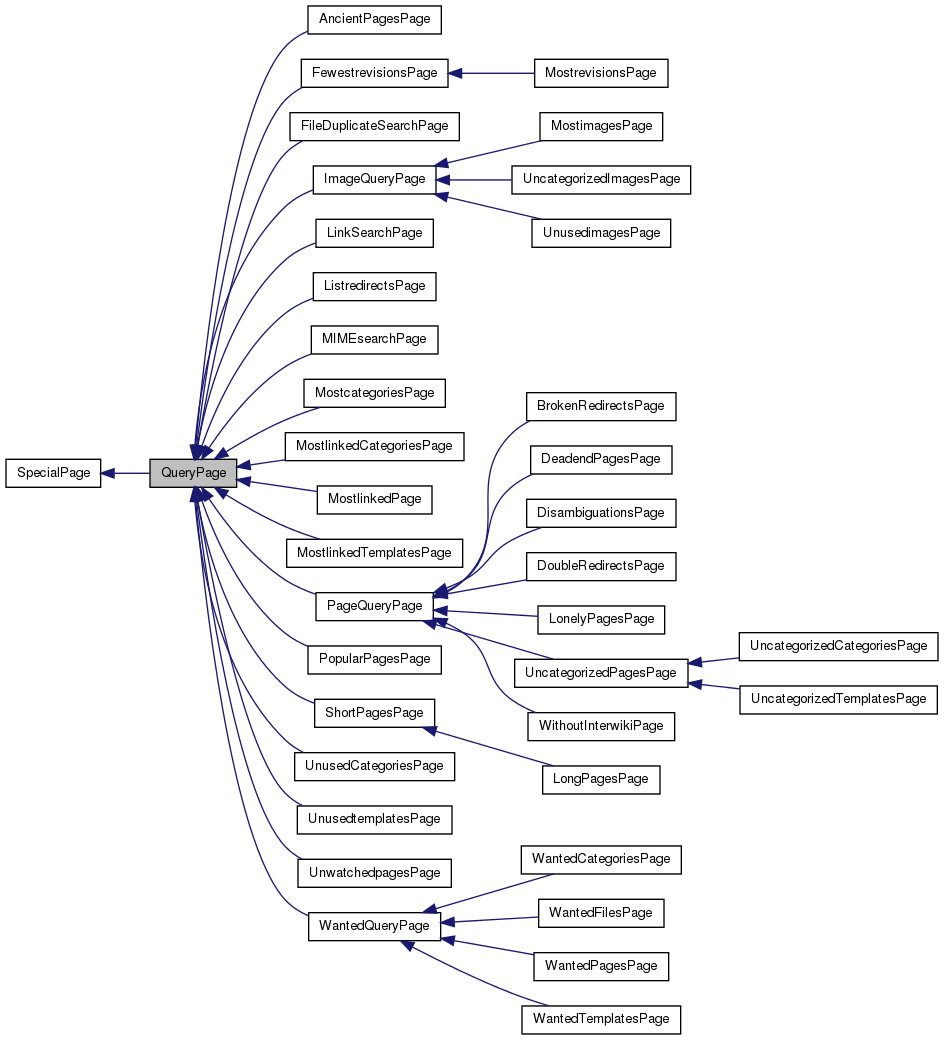
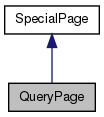
Public Member Functions | |
| closeList () | |
| doFeed ($class= '', $limit=50) | |
| Similar to above, but packaging in a syndicated feed instead of a web page. | |
| doQuery ($offset=false, $limit=false) | |
| Somewhat deprecated, you probably want to be using execute() | |
| execute ($par) | |
| This is the actual workhorse. | |
| feedDesc () | |
| feedItemAuthor ($row) | |
| feedItemDesc ($row) | |
| feedResult ($row) | |
| Override for custom handling. | |
| feedTitle () | |
| feedUrl () | |
| fetchFromCache ($limit, $offset=false) | |
| Fetch the query results from the query cache. | |
| formatResult ($skin, $result) | |
| Formats the results of the query for display. | |
| getCachedTimestamp () | |
| getOrderFields () | |
| Subclasses return an array of fields to order by here. | |
| getPageHeader () | |
| The content returned by this function will be output before any result. | |
| getQueryInfo () | |
| Subclasses return an SQL query here, formatted as an array with the following keys: tables => Table(s) for passing to Database::select() fields => Field(s) for passing to Database::select(), may be * conds => WHERE conditions options => options join_conds => JOIN conditions. | |
| getSQL () | |
| For back-compat, subclasses may return a raw SQL query here, as a string. | |
| isCacheable () | |
| Is the output of this query cacheable? Non-cacheable expensive pages will be disabled in miser mode and will not have their results written to the querycache table. | |
| isCached () | |
| Whether or not the output of the page in question is retrieved from the database cache. | |
| isExpensive () | |
| Is this query expensive (for some definition of expensive)? Then we don't let it run in miser mode. | |
| isSyndicated () | |
| Sometime we dont want to build rss / atom feeds. | |
| linkParameters () | |
| If using extra form wheely-dealies, return a set of parameters here as an associative array. | |
| openList ($offset) | |
| preprocessResults ($db, $res) | |
| Do any necessary preprocessing of the result object. | |
| reallyDoQuery ($limit, $offset=false) | |
| Run the query and return the result. | |
| recache ($limit, $ignoreErrors=true) | |
| Clear the cache and save new results. | |
| setListoutput ($bool) | |
| A mutator for $this->listoutput;. | |
| sortDescending () | |
| Override to sort by increasing values. | |
| tryLastResult () | |
| Some special pages (for example SpecialListusers) might not return the current object formatted, but return the previous one instead. | |
| usesTimestamps () | |
| Does this query return timestamps rather than integers in its 'value' field? If true, this class will convert 'value' to a UNIX timestamp for caching. | |
Public Attributes | |
| $limit = 0 | |
| $listoutput = false | |
| $offset = 0 | |
Protected Member Functions | |
| outputResults ($out, $skin, $dbr, $res, $num, $offset) | |
| Format and output report results using the given information plus OutputPage. | |
Protected Attributes | |
| $cachedTimestamp = null | |
| $numRows | |
| The number of rows returned by the query. | |
| $shownavigation = true | |
| Wheter to show prev/next links. | |
Detailed Description
This is a class for doing query pages; since they're almost all the same, we factor out some of the functionality into a superclass, and let subclasses derive from it.
Definition at line 65 of file QueryPage.php.
Member Function Documentation
- Returns:
- string
Definition at line 613 of file QueryPage.php.
Referenced by outputResults(), and FileDuplicateSearchPage\showList().

| QueryPage::doFeed | ( | $ | class = '', |
| $ | limit = 50 |
||
| ) |
Similar to above, but packaging in a syndicated feed instead of a web page.
Definition at line 625 of file QueryPage.php.
References $limit, $res, $wgFeed, $wgFeedClasses, $wgFeedLimit, feedDesc(), feedResult(), feedTitle(), feedUrl(), SpecialPage\getOutput(), and reallyDoQuery().

| QueryPage::doQuery | ( | $ | offset = false, |
| $ | limit = false |
||
| ) |
Somewhat deprecated, you probably want to be using execute()
Reimplemented in LinkSearchPage.
Definition at line 386 of file QueryPage.php.
References $limit, $offset, fetchFromCache(), isCacheable(), isCached(), and reallyDoQuery().

| QueryPage::execute | ( | $ | par | ) |
This is the actual workhorse.
It does everything needed to make a real, honest-to-gosh query page.
Reimplemented from SpecialPage.
Reimplemented in FileDuplicateSearchPage, MIMEsearchPage, LinkSearchPage, WithoutInterwikiPage, and WantedPagesPage.
Definition at line 439 of file QueryPage.php.
References $dbr, $out, $res, $user, $wgDisableQueryPageUpdate, $wgQueryCacheLimit, Xml\closeElement(), SpecialPage\displayRestrictionError(), fetchFromCache(), getCachedTimestamp(), SpecialPage\getLanguage(), SpecialPage\getName(), SpecialPage\getOutput(), getPageHeader(), SpecialPage\getRequest(), SpecialPage\getSkin(), SpecialPage\getTitle(), SpecialPage\getUser(), isCacheable(), isCached(), isSyndicated(), linkParameters(), SpecialPage\msg(), Xml\openElement(), SpecialPage\outputHeader(), outputResults(), preprocessResults(), reallyDoQuery(), SpecialPage\setHeaders(), SpecialPage\userCanExecute(), and wfGetDB().
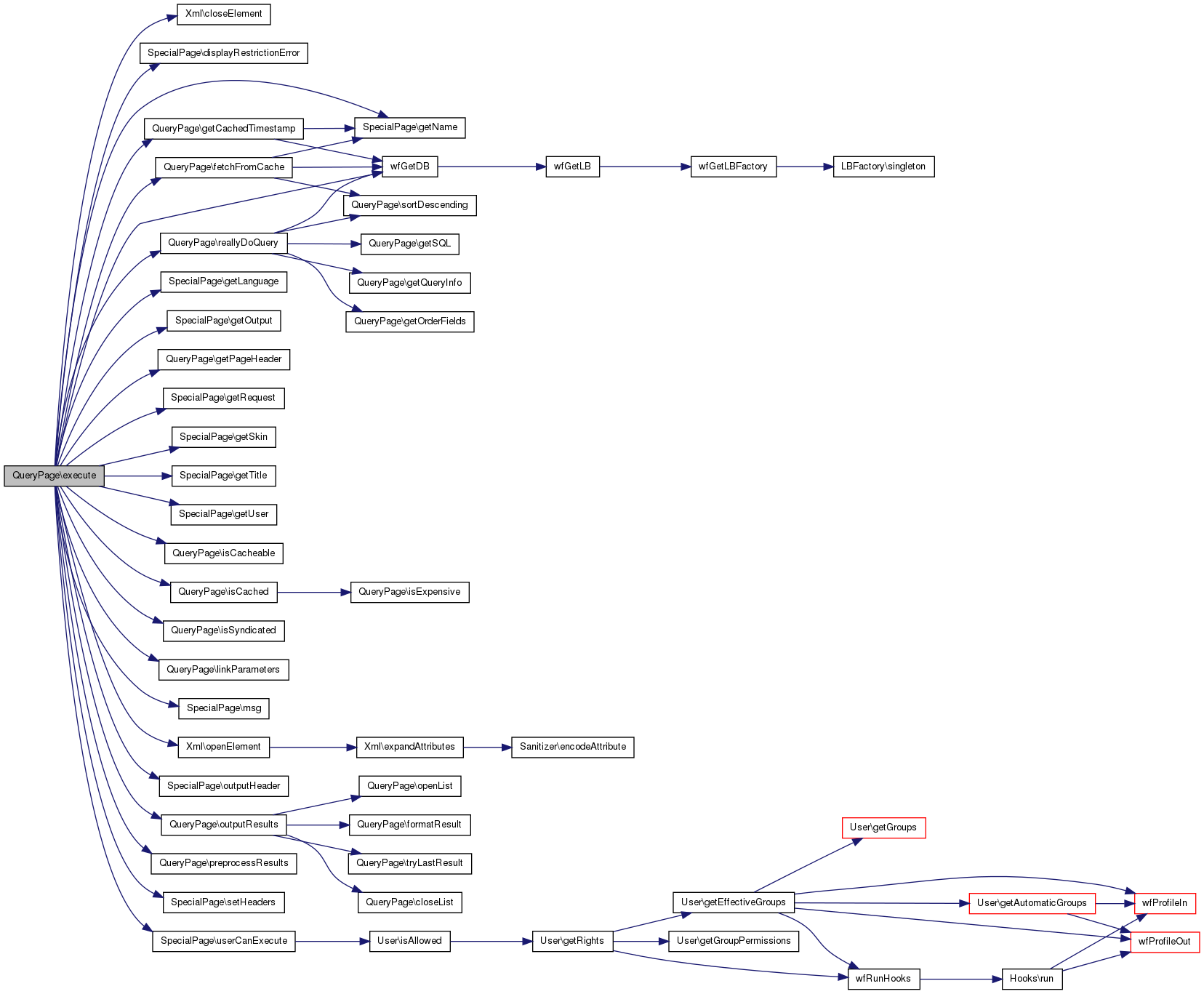
Definition at line 703 of file QueryPage.php.
References SpecialPage\msg().
Referenced by doFeed().


| QueryPage::feedItemAuthor | ( | $ | row | ) |
Definition at line 693 of file QueryPage.php.
Referenced by feedResult().

| QueryPage::feedItemDesc | ( | $ | row | ) |
Definition at line 689 of file QueryPage.php.
Referenced by feedResult().

| QueryPage::feedResult | ( | $ | row | ) |
Override for custom handling.
If the titles/links are ok, just do feedItemDesc()
Definition at line 664 of file QueryPage.php.
References $title, feedItemAuthor(), and feedItemDesc().
Referenced by doFeed().


Definition at line 697 of file QueryPage.php.
References $wgLanguageCode, $wgSitename, and SpecialPage\getDescription().
Referenced by doFeed().


Definition at line 707 of file QueryPage.php.
References SpecialPage\getTitle().
Referenced by doFeed().


| QueryPage::fetchFromCache | ( | $ | limit, |
| $ | offset = false |
||
| ) |
Fetch the query results from the query cache.
- Parameters:
-
$limit mixed Numerical limit or false for no limit $offset mixed Numerical offset or false for no offset
- Returns:
- ResultWrapper
- Since:
- 1.18
Definition at line 401 of file QueryPage.php.
References $dbr, $limit, $offset, $options, $res, SpecialPage\getName(), sortDescending(), and wfGetDB().
Referenced by doQuery(), and execute().


| QueryPage::formatResult | ( | $ | skin, |
| $ | result | ||
| ) | [abstract] |
Formats the results of the query for display.
The skin is the current skin; you can use it for making links. The result is a single row of result data. You should be able to grab SQL results off of it. If the function returns false, the line output will be skipped.
- Parameters:
-
$skin Skin $result object Result row
- Returns:
- mixed String or false to skip
- Parameters:
-
$skin Skin object $result Object: database row
Reimplemented in WantedQueryPage, LinkSearchPage, FileDuplicateSearchPage, DisambiguationsPage, ListredirectsPage, MostlinkedTemplatesPage, MostlinkedPage, MIMEsearchPage, BrokenRedirectsPage, ShortPagesPage, DoubleRedirectsPage, MostlinkedCategoriesPage, FewestrevisionsPage, UnwatchedpagesPage, UnusedtemplatesPage, AncientPagesPage, MostcategoriesPage, UnusedCategoriesPage, PopularPagesPage, WantedCategoriesPage, ImageQueryPage, and PageQueryPage.
Referenced by outputResults().

Definition at line 425 of file QueryPage.php.
References $dbr, $fname, SpecialPage\getName(), and wfGetDB().
Referenced by execute().


Subclasses return an array of fields to order by here.
Don't append DESC to the field names, that'll be done automatically if sortDescending() returns true.
- Returns:
- array
- Since:
- 1.18
Reimplemented in LinkSearchPage, DisambiguationsPage, DeadendPagesPage, DoubleRedirectsPage, LonelyPagesPage, BrokenRedirectsPage, WithoutInterwikiPage, UncategorizedPagesPage, ListredirectsPage, UnwatchedpagesPage, and ShortPagesPage.
Definition at line 151 of file QueryPage.php.
Referenced by reallyDoQuery().

The content returned by this function will be output before any result.
- Returns:
- String
Reimplemented in UnusedimagesPage, UnusedtemplatesPage, WithoutInterwikiPage, BrokenRedirectsPage, DoubleRedirectsPage, DisambiguationsPage, WantedFilesPage, LonelyPagesPage, DeadendPagesPage, and UnusedCategoriesPage.
Definition at line 241 of file QueryPage.php.
Referenced by execute().

Subclasses return an SQL query here, formatted as an array with the following keys: tables => Table(s) for passing to Database::select() fields => Field(s) for passing to Database::select(), may be * conds => WHERE conditions options => options join_conds => JOIN conditions.
Note that the query itself should return the following three columns: 'namespace', 'title', and 'value'. 'value' is used for sorting.
These may be stored in the querycache table for expensive queries, and that cached data will be returned sometimes, so the presence of extra fields can't be relied upon. The cached 'value' column will be an integer; non-numeric values are useful only for sorting the initial query (except if they're timestamps, see usesTimestamps()).
Don't include an ORDER or LIMIT clause, they will be added.
If this function is not overridden or returns something other than an array, getSQL() will be used instead. This is for backwards compatibility only and is strongly deprecated.
- Returns:
- array
- Since:
- 1.18
Reimplemented in LinkSearchPage, WithoutInterwikiPage, FileDuplicateSearchPage, WantedFilesPage, DoubleRedirectsPage, MostlinkedTemplatesPage, DeadendPagesPage, WantedPagesPage, LonelyPagesPage, UncategorizedImagesPage, UncategorizedPagesPage, UnusedimagesPage, MIMEsearchPage, BrokenRedirectsPage, FewestrevisionsPage, DisambiguationsPage, MostlinkedPage, PopularPagesPage, UnusedtemplatesPage, AncientPagesPage, ListredirectsPage, MostcategoriesPage, MostimagesPage, UnwatchedpagesPage, MostlinkedCategoriesPage, ShortPagesPage, WantedTemplatesPage, UnusedCategoriesPage, and WantedCategoriesPage.
Definition at line 130 of file QueryPage.php.
Referenced by reallyDoQuery().
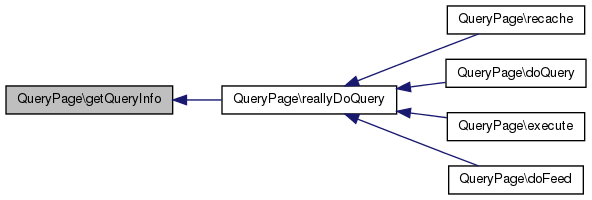
For back-compat, subclasses may return a raw SQL query here, as a string.
This is stronly deprecated; getQueryInfo() should be overridden instead.
- Returns:
- string
Definition at line 139 of file QueryPage.php.
Referenced by reallyDoQuery().

Is the output of this query cacheable? Non-cacheable expensive pages will be disabled in miser mode and will not have their results written to the querycache table.
- Returns:
- Boolean
- Since:
- 1.18
Reimplemented in FileDuplicateSearchPage, LinkSearchPage, and MIMEsearchPage.
Definition at line 197 of file QueryPage.php.
Referenced by doQuery(), execute(), and recache().

Whether or not the output of the page in question is retrieved from the database cache.
- Returns:
- Boolean
Reimplemented in FileDuplicateSearchPage.
Definition at line 207 of file QueryPage.php.
References $wgMiserMode, and isExpensive().
Referenced by doQuery(), execute(), WantedCategoriesPage\formatResult(), ShortPagesPage\formatResult(), WantedQueryPage\formatResult(), and ShortPagesPage\preprocessResults().

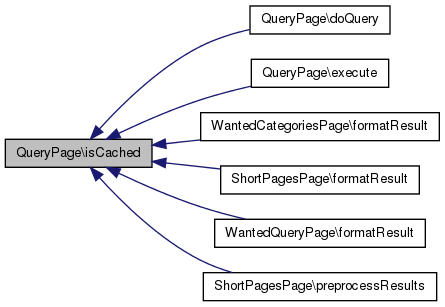
Is this query expensive (for some definition of expensive)? Then we don't let it run in miser mode.
$wgDisableQueryPages causes all query pages to be declared expensive. Some query pages are always expensive.
- Returns:
- Boolean
Reimplemented from SpecialPage.
Reimplemented in WantedQueryPage, WithoutInterwikiPage, DeadendPagesPage, LonelyPagesPage, MostlinkedTemplatesPage, UncategorizedImagesPage, UncategorizedPagesPage, MostlinkedPage, MostcategoriesPage, MostimagesPage, UnusedtemplatesPage, UnwatchedpagesPage, ListredirectsPage, MIMEsearchPage, BrokenRedirectsPage, DoubleRedirectsPage, FewestrevisionsPage, AncientPagesPage, DisambiguationsPage, PopularPagesPage, UnusedimagesPage, and UnusedCategoriesPage.
Definition at line 185 of file QueryPage.php.
References $wgDisableQueryPages.
Referenced by isCached().

Sometime we dont want to build rss / atom feeds.
- Returns:
- Boolean
Reimplemented in WantedQueryPage, LinkSearchPage, WithoutInterwikiPage, MostlinkedTemplatesPage, DeadendPagesPage, LonelyPagesPage, UncategorizedImagesPage, UncategorizedPagesPage, FileDuplicateSearchPage, UnusedimagesPage, FewestrevisionsPage, MostlinkedPage, PopularPagesPage, AncientPagesPage, MostcategoriesPage, MostimagesPage, UnusedtemplatesPage, UnwatchedpagesPage, ListredirectsPage, MIMEsearchPage, MostlinkedCategoriesPage, BrokenRedirectsPage, DoubleRedirectsPage, DisambiguationsPage, and ShortPagesPage.
Definition at line 218 of file QueryPage.php.
Referenced by execute().

If using extra form wheely-dealies, return a set of parameters here as an associative array.
They will be encoded and added to the paging links (prev/next/lengths).
- Returns:
- Array
Reimplemented in LinkSearchPage, FileDuplicateSearchPage, and MIMEsearchPage.
Definition at line 252 of file QueryPage.php.
Referenced by execute().

| QueryPage::openList | ( | $ | offset | ) |
- Parameters:
-
$offset
- Returns:
- string
Definition at line 606 of file QueryPage.php.
References $offset.
Referenced by outputResults(), and FileDuplicateSearchPage\showList().

| QueryPage::outputResults | ( | $ | out, |
| $ | skin, | ||
| $ | dbr, | ||
| $ | res, | ||
| $ | num, | ||
| $ | offset | ||
| ) | [protected] |
Format and output report results using the given information plus OutputPage.
- Parameters:
-
$out OutputPage to print to $skin Skin: user skin to use $dbr Database (read) connection to use $res Integer: result pointer $num Integer: number of available result rows $offset Integer: paging offset
Reimplemented in ImageQueryPage.
Definition at line 553 of file QueryPage.php.
References $dbr, $offset, $out, $res, $wgContLang, closeList(), formatResult(), openList(), and tryLastResult().
Referenced by execute().
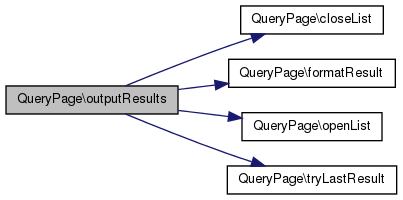

| QueryPage::preprocessResults | ( | $ | db, |
| $ | res | ||
| ) |
Do any necessary preprocessing of the result object.
Reimplemented in WantedQueryPage, DisambiguationsPage, MostlinkedTemplatesPage, ListredirectsPage, MostlinkedPage, ShortPagesPage, and MostlinkedCategoriesPage.
Definition at line 620 of file QueryPage.php.
Referenced by execute().

| QueryPage::reallyDoQuery | ( | $ | limit, |
| $ | offset = false |
||
| ) |
Run the query and return the result.
- Parameters:
-
$limit mixed Numerical limit or false for no limit $offset mixed Numerical offset or false for no offset
- Returns:
- ResultWrapper
- Since:
- 1.18
Definition at line 344 of file QueryPage.php.
References $dbr, $fname, $limit, $offset, $options, $res, getOrderFields(), getQueryInfo(), getSQL(), sortDescending(), and wfGetDB().
Referenced by doFeed(), doQuery(), execute(), and recache().


| QueryPage::recache | ( | $ | limit, |
| $ | ignoreErrors = true |
||
| ) |
Clear the cache and save new results.
- Parameters:
-
$limit Integer: limit for SQL statement $ignoreErrors Boolean: whether to ignore database errors
Definition at line 273 of file QueryPage.php.
References $dbr, $fname, $limit, $res, SpecialPage\getName(), isCacheable(), reallyDoQuery(), usesTimestamps(), wfGetDB(), and wfTimestamp().

| QueryPage::setListoutput | ( | $ | bool | ) |
A mutator for $this->listoutput;.
- Parameters:
-
$bool Boolean
Definition at line 100 of file QueryPage.php.
Referenced by WantedPagesPage\execute().

Override to sort by increasing values.
- Returns:
- Boolean
Reimplemented in DisambiguationsPage, ShortPagesPage, FewestrevisionsPage, WithoutInterwikiPage, MostlinkedTemplatesPage, AncientPagesPage, UnwatchedpagesPage, UnusedCategoriesPage, DeadendPagesPage, MostlinkedCategoriesPage, LonelyPagesPage, UnusedtemplatesPage, ListredirectsPage, BrokenRedirectsPage, DoubleRedirectsPage, UnusedimagesPage, UncategorizedImagesPage, UncategorizedPagesPage, LongPagesPage, and MostrevisionsPage.
Definition at line 174 of file QueryPage.php.
Referenced by fetchFromCache(), and reallyDoQuery().

Some special pages (for example SpecialListusers) might not return the current object formatted, but return the previous one instead.
Setting this to return true will ensure formatResult() is called one more time to make sure that the very last result is formatted as well.
Definition at line 263 of file QueryPage.php.
Referenced by outputResults().

Does this query return timestamps rather than integers in its 'value' field? If true, this class will convert 'value' to a UNIX timestamp for caching.
NOTE: formatRow() may get timestamps in TS_MW (mysql), TS_DB (pgsql) or TS_UNIX (querycache) format, so be sure to always run them through wfTimestamp()
- Returns:
- bool
- Since:
- 1.18
Reimplemented in UnusedimagesPage, and AncientPagesPage.
Definition at line 165 of file QueryPage.php.
Referenced by recache().

Member Data Documentation
QueryPage::$cachedTimestamp = null [protected] |
Definition at line 88 of file QueryPage.php.
| QueryPage::$limit = 0 |
Definition at line 79 of file QueryPage.php.
Referenced by doFeed(), LinkSearchPage\doQuery(), doQuery(), fetchFromCache(), reallyDoQuery(), and recache().
| QueryPage::$listoutput = false |
Definition at line 71 of file QueryPage.php.
QueryPage::$numRows [protected] |
The number of rows returned by the query.
Reading this variable only makes sense in functions that are run after the query has been done, such as preprocessResults() and formatRow().
Definition at line 86 of file QueryPage.php.
Referenced by FileDuplicateSearchPage\execute().
| QueryPage::$offset = 0 |
Definition at line 78 of file QueryPage.php.
Referenced by LinkSearchPage\doQuery(), doQuery(), fetchFromCache(), openList(), outputResults(), and reallyDoQuery().
QueryPage::$shownavigation = true [protected] |
Wheter to show prev/next links.
Definition at line 93 of file QueryPage.php.
The documentation for this class was generated from the following file:
- includes/QueryPage.php
